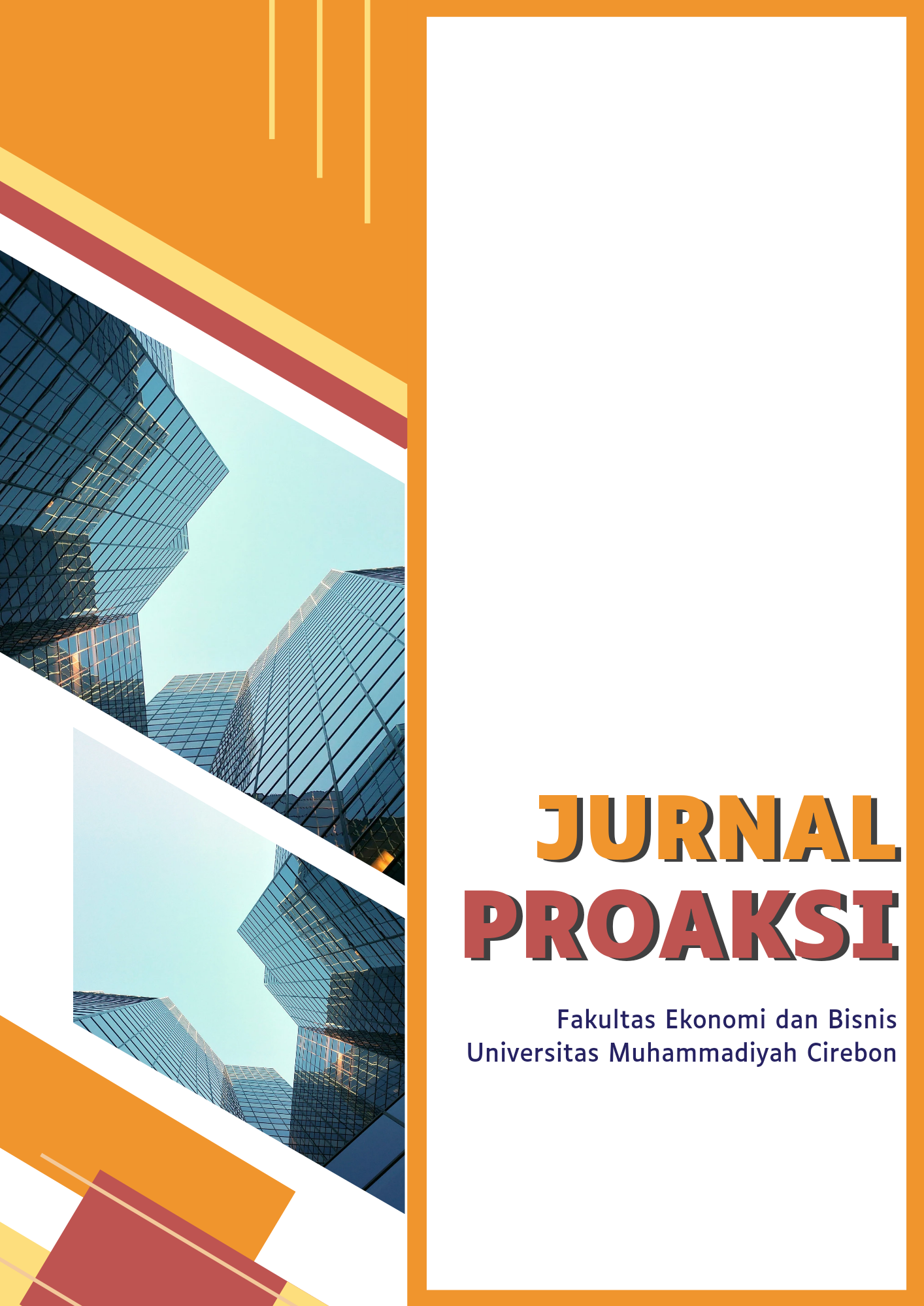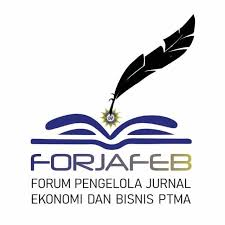Determinants of Students’ Intention to Become Tax Consultants
DOI:
https://doi.org/10.32534/jpk.v12i2.7000Kata Kunci:
Theory of Planned Behavior, Social Cognitive Career Theory, Labor Market Considerations, Self-efficacy Technical Skill, Tax ConsultantAbstrak
Tujuan Utama– Penelitian ini bertujuan untuk menganalisis pengaruh pertimbangan pasar kerja, norma subjektif, self-efficacy-kemampuan teknis, dan outcome expectation terhadap niat menjadi konsultan pajak.
Metode–PenelitianMetode – Penelitian ini menggunakan metode kuantitatif dengan pendekatan Structural Equation Modelling (SEM). Sampel penelitian terdiri dari 170 mahasiswa prodi Akuntansi Perpajakan UII.
Temuan Utama – Hasil penelitian menunjukkan bahwa niat mahasiswa untuk menjadi konsultan pajak lebih dipengaruhi oleh norma subjektif dan outcome expectation. Namun demikian, tidak ditemukan pengaruh pertimbangan pasar kerja dan self-efficacy kemampuan teknis terhadap niat menjadi konsultan pajak.
Implikasi Teori dan Kebijakan – Hasil penelitian menunjukkan bahwa lingkungan sekitar menjadi faktor yang pengaruh untuk menjadi konsultan pajak. Oleh karenanya penting bagi akademisi untuk memberikan informasi memadai mengenai peran profesi konsultan pajak masa kini. Selain itu, hasil penelitian ini dapat menjadi dasar bagi perusahaan yang hendak merektut konsultan pajak untuk memberikan kompensasi dan imbalan yang sesuai dengan pekerjaan mereka.
Kebaruan Penelitian – Penelitian ini mengelaborasi Theory of Planned Behavior (TPB) dan Social Cognitive Career Theory (SCCT) untuk menggali niat mahasiswa menjadi konsultan pajak.
Kata Kunci: Theory of Planned Behavior, Social Cognitive Career Theory, Pertimbangan Pasar Kerja, Self-efficacy Kemampuan Teknis, Konsultan Pajak.
Unduhan
Referensi
Adigamova, F. F., & Tufetulov, A. M. (2014). Training of tax consultants: Experience and prospects. Procedia-Social and Behavioral Sciences, 152, 1133–1136.
Ajzen, I. (1991). The Theory of Planned Behavior. Organizational Behavior and Human Desicion Process, 50, 179–211.
Ajzen, I. (2002). Perceived behavioral control, self-efficacy, locus of control, and the theory of planned behavior. Journal of Applied Social Psychology, 80(6), 2918–2940.
Aningtiyas, D. R. S. (2019). Mengenal Profesi Konsultan Pajak. Retrieved from Direktorat Jendral Pajak website: https://pajak.go.id/id/artikel/mengenal-profesi-konsultan-pajak
Aslan, L. (2021). The evolving competencies of the public auditor and the future of public sector auditing. In Contemporary Issues in Public Sector Accounting and Auditing, 113–129.
Bandura, A. (1986). Social foundations of thought and action (2nd ed.). NJ: Englewood Cliffs.
Bandura, A. (. (1989). Human Agency in Social Cognitive Theory. American Psychologist, 44(9), 1175.
Djatej, A., Chen, Y., Green, B., Eriksen, S., & Zhou, D. (2015). Understanding Students Major Choice in Accounting: An Application of The Theory of Reasoned Action. Global Perspectives on Accounting Education, 12, 53–72.
Dobrow, S. R., & Tosti?Kharas, J. (2011). Calling: The development of a scale measure. Personnel Psychology, 64(4), 1001–1049.
Gati, I., & Kulcsár, V. (2021). Making Better Career Decisions: From Challenges to Opportunities. Journal of Vocational Behavior, 126, 103545.
Ghozali, M., & Latan, H. (2015). Partial Least Squares Konsep Teknik dan Aplikasi Menggunakan Program Smart PLS 3.0. untuk Penelitian Empiris (2nd ed.). Semarang: Badan Penerbit Universitas Diponegoro.
Gorgievski, M. J., Stephan, U., Laguna, M., & Moriano, J. A. (2018). Predicting entrepreneurial career intentions: values and the theory of planned behavior. Journal of Career Assessment, 26(2), 457–475.
Gunawardena, L., Hemachandra, D., & Kodithuwakku, S. S. (2018). Career Intention of Undergraduate Students: An Application of Theory of Planned Behavior. IUP Journal of Entrepreneurship Development, 15(1).
Hair, J. F., Hult, G. T. M., Ringle, C. M., & Sarstedt, M. (2017). A Primer on Partial Least Squares Structural Equation Modeling (PLS-SEM) (2nd ed.). Sage Publications.
Hatane, S. E., Setiono, F. J., Setiawan, F. F., Semuel, H., & Mangoting, Y. (2021). Learning environment, students’ attitude and intention to enhance current knowledge in the context of choosing accounting career. Journal of Applied Research in Higher Education, 13(1), 79–97.
Irawan, K., Astriani, D., & Puspitasari, M. (2023). Factors Affecting Accounting Student’s Interest in a Career in Taxation. Proceeding International Confrence on Religious & Cultural Sciences Peneleh Research Institute, 5, 50–58.
Kholid, M. N., Tumewang, Y. K., & Salsabilla, S. (2020). Understanding Students ’ Choice of Becoming Certified Sharia Accountant in Indonesia. Journal of Asian Finance, Economics and Business, 7(10), 219–230. https://doi.org/10.13106/jafeb.2020.vol7.n10.219
Kosasi, J., & Kazia, L. (2024). Pengaruh Motivasi, Self-Efficacy, Prospek Kerja, PengetahuanPerpajakan, Nilai Sosial, dan Persepsi terhadap Minat Mahasiswa Jurusan Akuntansi untuk Menjadi Konsultan Pajak. Jurnal Eksplorasi Akuntansi, 6(3), 946–960.
KP3SKP. (2024). Sertifikasi Konsultan Pajak. Retrieved from KP3SKP website: https://klc2.kemenkeu.go.id/sertifikasi/uskp/
Kurniawati, D. (2024). Indonesia Masih Butuh Profesional Pajak Andal, Anak Muda Perlu Bersiap.
Laoli, N. (2024). Ditjen Pajak: Pelaporan SPT Tahunan Masih Jauh dari Target. Retrieved from Kontan.co.id website: https://nasional.kontan.co.id/news/ditjen-pajak-pelaporan-spt-tahunan-masih-jauh-dari-target
Lastuti, S., & Dandri. (2018). Pengaruh Self Efficacy, Ekspektasi Hasil Dan Ketertarikan Personal Pada Pilihan Karir Konsultan Keuangan : Studi Pada Mahasiswa Program Studi Manajemen Di Surakarta. Buletin Ekonomi, 16(2), 137–261.
Lee, W. E., & Schmidt, D. (2014). multigroup analysis of students’ intention to major in accounting before, during, and after the recession: Emergence of a professional ethics perception. Advances in Accounting Education: Teaching and Curriculum Innovations, 15, 33–57.
Lent, R. W., Brown, S. D., & Hackett, G. (1994). Toward A Unifying Social Cognitive Theory Of Career And Academic Interest, Choice, And Performance. Journal of Vocational Behavior, 45(1), 79–122.
Li, X., Dai, J., Zhu, X., Li, J., He, J., Huang, Y., … Shen, Q. (2023). Mechanism of attitude, subjective norms, and perceived behavioral control influence the green development behavior of construction enterprises. Humanities and Social Sciences Communications, 10(1), 1–13.
Liguori, Bendickson, J. S., & McDowell, W. C. (2018). Revisiting Entrepreneurial Intentions: a Social Cognitive Career Theory Approach. International Entrepreneurship and Management Journal, 14(1), 67–78.
Liguori, E., Winkler, C., Vanevenhoven, J., Winkel, D., & James, M. (2020). Entrepreneurship As A Career Choice: Intentions, Attitudes, And Outcome Expectations. Journal of Small Business and Entrepreneurship, 32(4), 311–331.
Lorensia, F., Pratiwi, H., & Petra, B. A. (2022). Persepsi Karir, Motivasi Sosial, Dan Pertimbangan Pasar Kerja Terhadap Peminatan Karir sebagai Konsultan Pajak dengan Self Efficacy sebagai Variabel Moderasi. Jurnal Ekobistek, 11(2), 98–104.
Luc, P. T. (2020). Outcome expectations and social entrepreneurial intention: Integration of planned behavior and social cognitive career theory,. The Journal of Asian Finance, Economics and Business, 7(6), 399–407.
Mokhlis, S., Hussin, N. S. N., Nizam, N. Z., & Noor, N. A. M. (2022). Predicting Malaysian university students’ intent to pursue retailing career: Applicability of theory of planned behavior. International Journal of Professional Business Review.
Muterera, J. (2024). THE AUDITOR SELF-EFFICACY SCALE: MEASURING CONFIDENCE IN TECHNICAL SKILLS, TECHNOLOGICAL ADAPTATION, AND INTERPERSONAL COMMUNICATION. Finance & Accounting Research Journal, 6(3), 331–346.
Nada, U., & Afriyenti, M. (2023). Pengaruh Efikasi Diri dan Ekspektasi Hasil terhadap Niat Mahasiswa Berkarir di Bidang Akuntansi Pemerintahan: Studi Empiris pada Mahasiswa Jurusan Akuntansi di Kota Padang. Jurnal Eksplorasi Akuntansi, 5(4), 1759–1774.
Norlaela, A., & Muslimin, M. (2023). Pengaruh Pelatihan Profesional, Penghargaan Finansial, dan Pertimbangan Pasar Kerja terhadap Minat Berkarir Akuntan Publik. Jurnal Ekonomi, Keuangan, Dan Bisnis Syariah, 5(2).
Pratiwi, A., Khairunnisa, A. A., Ramadhandy, A. D., & Savitri, A. E. (2024). Efektivitas Kepatuhan Wajib Pajak, Pemeriksaan Pajak dan Penagihan Pajak terhadap Penerimaan Pajak. Studi Akuntansi, Keuangan, Dan Manajemen, 3(2), 107–117.
Presiden Republik Indonesia. (2024). Proyeksikan Pendapatan Negara Rp2.996,9 Triliun, Presiden Tekankan Pentingnya Kehati-hatian Pembiayaan dalam RAPBN 2025. Retrieved from Biro Pers, Media, dan Informasi Sekretariat Presiden website: https://www.presidenri.go.id/siaran-pers/proyeksikan-pendapatan-negara-rp2-9969-triliun-presiden-tekankan-pentingnya-kehati-hatian-pembiayaan-dalam-rapbn-2025/
Purba, R. B., & Umar, H. (2021). Kualitas Audit dan Deteksi Korupsi (1st ed.). Medan: Merdeka Kreasi.
Ratuwalangon, N., Tangkau, J., & Moroki, F. (2023). Analisis Kepatuhan Pajak Usaha Mikro Kecil Dan Menengah (UMKM). Jurnal Akuntansi Manado (JAIM), 120–127.
Schoenfeld, J., Segal, G., & Borgia, D. (2017). Social Cognitive Career Theory And The Goal Of Becoming A Certified Public Accountant. Accounting Education, 26(2), 109–126.
Septiani, D., Hambani, S., & Aziz, A. J. (2024). Pengaruh Pengetahuan Sertifikasi Pajak, Penghargaan Finansial, Dan Pertimbangan Pasar Kerja Terhadap Pemilihan Karir Mahasiswa Sebagai Konsultan Pajak. Innovative: Journal Of Social Science Research, 4(4), 6451–6464.
Sidig, D. S., & Sinaga, A. R. (2020). What Explains Student’s Intentions to Pursue Public Accountants as a Career? Jurnal Akuntansi Dan Keuangan Indonesia, 17(1).
Solikhah, B. (2014). An Application of Theory of Planned Behavior towards CPA Career in Indonesia. Procedia - Social and Behavioral Sciences, 164, 397–402.
Tetteh, L. A., Agyenim-Boateng, C., Kwarteng, A., Muda, P., & Sunu, P. (2022). Utilizing the social cognitive career theory in understanding students’ choice in selecting auditing as a career: evidence from Ghana. Ournal of Applied Accounting Research, 23(3), 715–737.
Ukhra, G., Kholid, M. N., & Salsabilla, S. (2024). Accounting Students’ Perspectives on the Factors that Determine Their Career as Government Auditors. Jurnal Proaksi, 11(1), 19–29.
Ulma, F. K., Khanifah, K., & Retnoningsih, S. (2023). Pengaruh Motivasi, Gender, Self Efficacy, Dan Pertimbangan Pasar Kerja Terhadap Minat Berkarier Menjadi Akuntan Publik, Konsultan Pajak Dan Bankir. Jurnal Akuntansi, 17(1), 43–58.
Umar, I., & Bello, M. S. (2019). The Relationship between Accounting Students’ Self-Efficacy Beliefs, Outcome Expectations on Intention to Become Chartered Accountants. East African Scholars Journal of Economics, Business and Management, 2(7).
Vamvaka, V., Stoforos, C., Palaskas, T., & Botsaris, C. (2020). Attitude toward entrepreneurship, perceived behavioral control, and entrepreneurial intention: dimensionality, structural relationships, and gender differences. Ournal of Innovation and Entrepreneurship, 9, 1–26.
Wildan, M. (2022). Indonesia Masih Membutuhkan Lebih Banyak Ahli Pajak, Ini Alasannya.
Wildan, M. (2023). Jumlah Pegawai Pajak untuk Pengawasan Terbatas, Tak Semua WP “Diawasi.”
Yulianti, V., Oktaviano, B., & Ristanti, D. (2022). Penghargaan Finansial, Pengakuan Profesional, Pertimbangan Pasar Kerja,Dan Lingkungan Kerja Terhadap Pemilihan Karir Sebagai Konsultan Pajak Pada Mahasiswa Akuntansi Universitas Pelita Bangsa. Jurnal Akuntansi Bisnis Pelita Bangsa, 7(1).
Unduhan
Diterbitkan
Terbitan
Bagian
Lisensi
Hak Cipta (c) 2025 Selfira Salsabilla

Artikel ini berlisensi Creative Commons Attribution 4.0 International License.




















